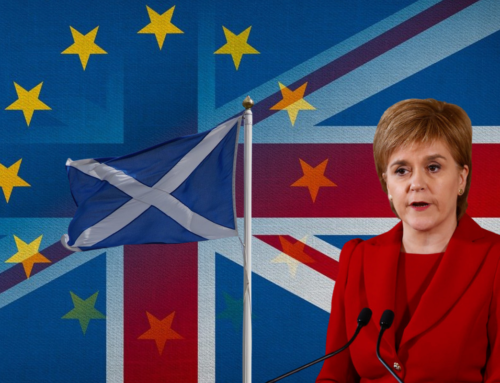
by Brendan Donnelly
Director, The Federal Trust
7th May 2019
Of all the strange and unpredictable events generated by Brexit, the current negotiations between the Prime Minister and the Leader of the Opposition must be the oddest.
Both Theresa May and Jeremy Corbyn know that any agreement likely to be achieved between them will be, for diametrically opposed reasons, unacceptable to probably half of their respective Parliamentary parties. If such an agreement could be passed by Parliament it would only be by the narrowest of majorities, in a way that would split both parties, probably irreparably. Yet both the Labour and the Conservative leaderships still believe that it is in their interest to continue, or at least to appear to continue, with these negotiations. Even more bizarrely, they affect to believe that the disastrous performance in the English local elections of the Conservative Party and the Labour Party’s failure to make gains constitute a mandate for their further negotiations.
Underlying this self-defeating pantomime is of course the fundamental truth that there are no good choices offered to anyone in any circumstances by Brexit. It is a delusion to imagine that more adept or consensual politicians could have avoided or even substantially mitigated the bleak and damaging menu of choices that Brexit inevitably implies. But particular urgency has been given to the May/Corbyn negotiations by the imminence of the European elections, which neither Party leader wants to contest. Both of them have a clear interest in preventing these elections by a “successful” outcome to their negotiations. Even if they are unable to do so, carrying on the talks will serve as a useful distraction from the embarrassments and challenges posed by the approaching polls on 23rd May.
In truth, European elections at this point do present an existential challenge to both major parties. Both of them are subject to major and crippling divisions within their own ranks on the European issue. Corbyn and May rightly fear catastrophic results in what is regarded by many voters as a “second-order” election decided by Proportional Representation, with many alternatives available to the electorate beyond the traditional binary choice offered by the first-past-the-post electoral system. The wishful thinking which has not merely infected, but rather spawned the whole Brexit process is once more operative in the May-Corbyn negotiations. The European elections are so dire a prospect for both of them that they are desperately seeking for the less painful alternative which they want to believe exists. Unfortunately, there is no less painful alternative.
The quantum of pain that Brexit will inflict on this country and its political system is largely fixed by external reality. British politicians can to some extent choose the nature of that pain, to make it more political or economic in its impact. They cannot, however, significantly affect its extent. The May/Corbyn negotiations are being conducted, at least in their public aspect, as an attempt to do just that. If the Prime Minister and Labour leader do come to an agreement which they put to their parties, they will be committing the error Bismarck described as “suicide from fear of death.”
Shipwreck ahoy
It is of course overwhelmingly likely that the current negotiations will simply fail and the next stage of the Brexit tragicomedy will be electoral annihilation for the Conservatives and further disappointment for Labour on 23rd May. The Conservative Party cannot accept the Customs Union to which the Labour leadership are so attached, while many, perhaps most Labour MPs will insist on the holding of a second referendum as a (to the Conservative unacceptable) condition of any arrangement. It is entirely possible that the Prime Minister will make one last attempt before 23rd May to bring the Withdrawal Agreement back to the House of Commons, in the hope that her backbenchers will eventually have come to fear “no Brexit” more than her unsatisfactory Brexit. Any such attempt seems likely to meet the same fate as its three ill-fated predecessors. The new deadline for Brexit of 31st October will reassure many MPs still minded to reject the Withdrawal Agreement but concerned by the prospect of “no deal.” The Prime Minister’s personal and political weakness will encourage her rivals to make an attempt to topple her by a further humiliating rejection of the Agreement.
Meanwhile, the rest of the European Union is watching these undignified proceedings with a mixture of bleak amusement and growing anger, not least because the Conservative-Labour negotiations are taking place with little or no reference to the often-expressed positions of the Union itself. Donald Tusk’s friendly advice to British politicians not to waste the extension period until 31st October was undoubtedly good advice. Sadly, it is advice the British political system is structurally unable to embrace.
Fantasy and nonsense
The contrasting divisions within both the main parties mean that no government other than a cross-party government can face up to, let alone choose between the differing traumatic options implicit in Brexit. The precarious unity of the Conservative and Labour Parties can only be held together by fantasy, evasion and ambiguity. The present nonsensical negotiations between Theresa May and Jeremy Corbyn represent a last, desperate ambition to extend these fantasies across party boundaries. They are doomed to failure, and the only question is whether this failure is manifested through an abrupt public termination, a vote in the House of Commons or a vote in the European elections. In their self-destructive hopelessness, the negotiations between Jeremy Corbyn and Theresa May are a fitting summary of the whole Brexit process. It is wholly possible they may be its epitaph as well.






